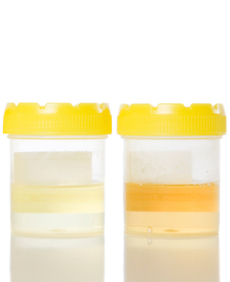PCA3 May Have Role Predicting Prostate Biopsy Outcome
The use of a prostate cancer antigen 3 urine test could help men avoid undergoing unnecessary repeat biopsies, and predict which will be positive for cancer.
Could a urine test help men avoid undergoing unnecessary repeat biopsies?

The use of a prostate cancer antigen 3 (PCA3) urine test could help men avoid undergoing unnecessary repeat biopsies, and could help physicians predict which men undergoing initial biopsy will be positive for cancer.
John T. Wei, MD, of the University of Michigan, and colleagues published the results of the National Cancer Institute Early Detection Research Network validation of PCA3 trial in the Journal of Clinical Oncology.
According to Wei, how physicians decide to send a patient for prostate biopsy is continuing to evolve. Although in the past, an abnormal PSA test resulted in an order for a biopsy, the discovery and validation of new biomarkers is changing that precedent.
“Prostate cancer tests such as the PCA3, an FDA approved, commercially available urine assay for prostate cancer, are allowing doctors to more accurately determine if a man has prostate cancer prior to a biopsy,” Wei told Cancer Network. “Based on our findings, using PCA3, many fewer men will need to undergo a repeat prostate biopsy. On the other hand, PCA3 may also indicate an elevated risk of prostate cancer in other men, prompting them to undergo a prostate biopsy when its needed.”
In the study, Wei and colleagues evaluated 859 men scheduled for diagnostic prostate biopsy between 2009 and 2011. The researchers evaluated whether the PCA3 urine test had a high positive predictive value at initial biopsy and a high negative predictive value at repeat biopsy.
Among men undergoing initial biopsy, the test had a positive predictive value of 80%. With a PCA3 cutoff of 60, the test had a 0.42 sensitivity and a 0.91 specificity. Looking at men undergoing repeat biopsy, the negative predictive value was 88%. With a PCA3 score of less than 20, the sensitivity was 0.76 and the specificity was 0.52.
One of the potential benefits of the PCA3 test would be to avoid unnecessary biopsies, according to the researchers. When they looked at men with a PCA3 score of less than 20, 46% of men would have avoided a biopsy; however, of those men, 12% would have had an undiagnosed cancer and 3% would have had an undiagnosed high-grade cancer.
“At a PCA3 score of 20 or lower, we found that the rate of underdiagnosis of high-grade cancers was low in the setting of repeat prostate biopsy; however, a high rate of underdiagnosis was observed in the initial biopsy setting,” the researchers wrote. “This latter finding suggests that a lower PCA3 threshold or other biomarkers may be necessary to rule out a biopsy in the initial setting but does not detract from its ability to rule in a biopsy at a PCA3 of more than 60.”
Overall, Wei said to “keep in mind that no test is perfect and individual counseling to undergo a prostate biopsy is still recommended.”